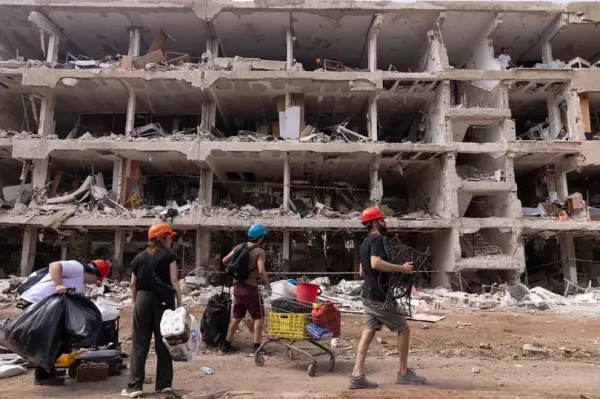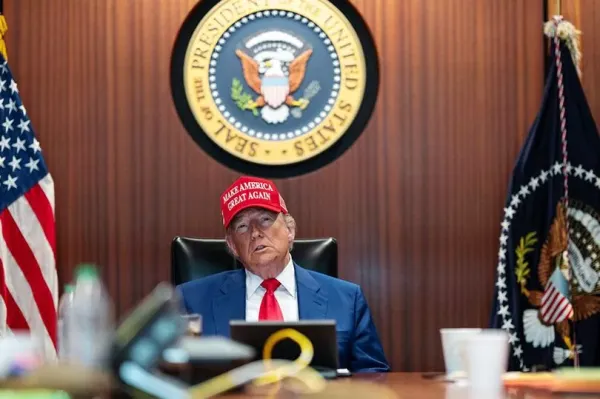
The UK will commit to ramping up defence and security spending to 5% of GDP by 2035 to meet rising global threats, Keir Starmer vows tonight.
NATO allies have agreed to the target ahead of a crunch summit in the Hague on Tuesday, which is expected to be dominated by the escalating crisis in the Middle East. Downing Street said the Prime Minister will urge all sides to step back from the brink and find a diplomatic solution to the rapidly spiralling conflict between Iran and Israel.
It comes after Donald Trump ordered US bombing raids on three Iranian nuclear facilities and floated the prospect of regime change in Tehran. The Prime Minister said the UK would meet this "era of radical uncertainty" by pouring cash into defence and security as he prepared to head for the Netherlands for one of the most significant NATO summits since the Cold War.
Frantic negotiations have been underway to give the US President a win at his first NATO gathering since his re-election - and persuade him not to pull US support from Europe. Mr Trump has repeatedly demanded that members of the Western defensive alliance do more to foot the bill for Europe's security.
READ MORE: British national injured in Israel after wave of strikes in Middle East, David Lammy says

At a NATO summit in 2018, he accused allies of freeloading off the United States, saying: "Many countries owe us a tremendous amount of money from many years back." Mr Trump alarmed allies by pausing military aid from Ukraine and temporarily cutting off intelligence sharing following his White House clash with Volodymyr Zelensky in February.
Downing Street said the defence commitment would be split between 3.5% on core defence and 1.5% resilience and security, with a target date of 2035. But the move will raise questions over how it will be funded - and whether the redrawn definition to include infrastructure spending will go far enough.
Mr Starmer announced plans to spend 2.5% of GDP on defence by 2027 earlier this year, funded by a raid on the foreign aid budget. He also committed to hit 3% in the next Parliament but has not set out how this would be paid for yet.
The latest target of 3.5% on core defence represents a significant jump. The Royal United Services Institute estimated it would cost £40 billion a year more than keeping the figure at 2.5%.
A No10 spokesman described the figure as "a projected target" that allies would review in 2029 when NATO carries out its next capability assessment.
Germany is expected to announce it will hit 3.5% by 2029, putting it far ahead of the UK.

Mr Starmer said: "We must navigate this era of radical uncertainty with agility, speed and a clear-eyed sense of the national interest to deliver security for working people and keep them safe. That’s why I have made the commitment to spend 5% of GDP on national security.
"This is an opportunity to deepen our commitment to NATO and drive greater investment in the nation’s wider security and resilience. After all, economic security is national security, and through this strategy we will bring the whole of society with us, creating jobs, growth and wages for working people – guided by my Plan for Change.”
Downing Street said the pledge was a "generational increase in defence and security spending" - which would have a major impact on the strength of NATO.
The PM's spokesman said: "The Prime Minister will travel to NATO tomorrow morning against a backdrop of global volatility. While there, you can expect the Prime Minister to continue to call for a diplomatic way forward in the Middle East, following his extensive conversations with partners over the weekend."
Mr Starmer will continue to press for a "just and lasting peace" in Ukraine, arguing that is only possible if Kyiv is given the support it needs to deter Russian aggression, No10 said. "There will be no let up in our support, which will continue as long as it is necessary," the spokesman added.
NATO Secretary General Mark Rutte said the new 5% baseline was a "quantum leap", adding: "The threats we face today demands that we do far, far more to ensure we can effectively deter and defend."
He told reporters: "While NATO is and will remain a defensive alliance, there should be no doubt about our ability and resolve to protect our nations and respond with resounding force should we be attacked. This is what it means to be a more lethal alliance."
The new defence commitment is expected to include investment in areas like cracking down on smuggling gangs and energy security.
The new National Security Strategy is expected to be published on Tuesday, spelling out the greatest threats Britain faces and how the Government will keep people safe. It will warn Britain must face down "grey zone" threats, such as cyber attacks or sabotage of energy networks, transport systems and digital communications.
It will also include details from a long-awaited audit of relations with China as the Government tries to balance security concerns with boosting economic ties with Beijing
The strategy will also warn that the UK risks falling behind if it fails to step up on crucial areas like science, education and border technology. Building domestic capabilities in defence and security will create jobs and drive up investment in Britain, the Government said.
READ MORE: Join our Mirror politics WhatsApp group to get the latest updates from Westminster